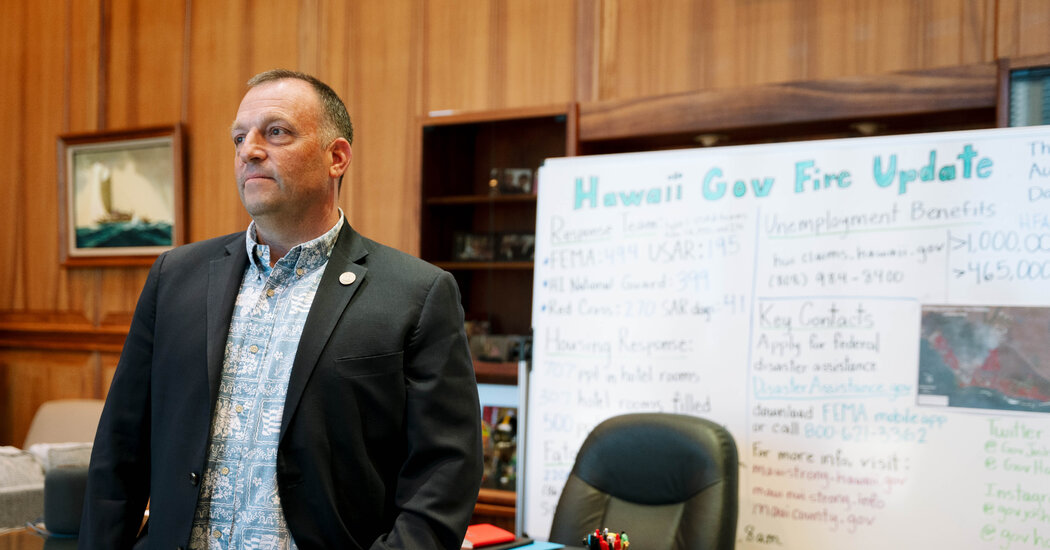On Monday, Gov. Josh Green of Hawaii said his state intended to sue fossil fuel companies over their role in climate change to make them pay for damage from its effects, like the 2023 wildfires that devastated Maui.
“I guess this might be breaking news,” he said during an interview on local television. “We will be filing suit.”
On Wednesday, the Trump administration sued Hawaii first, seeking to block the lawsuit before it could even be filed.
The Justice Department also filed a nearly identical suit against Michigan, where Attorney General Dana Nessel has retained three private law firms to pursue climate change litigation but has not yet sued. The main thrust of the administration’s argument is that the federal government should determine national energy policy, not individual states.
Legal experts said it was highly unusual to sue to block other lawsuits that have yet to be filed.
Nine Democratic-led states have already sued fossil fuel companies over climate change, along with dozens of municipalities around the country, including Honolulu and Maui. The oil industry and its allies have tried to get those cases thrown out by making similar arguments to the ones put forth in the Justice Department filings this week.
The lawsuits filed this week in Hawaii and Michigan cite President Trump’s April 8 executive order, “Protecting American Energy From State Overreach,” which argued that state policies inhibiting the energy industry weaken national security and drive up costs for Americans. It also said that the other lawsuits already filed by states over climate change could result in “crippling” damages to oil companies being sued.
Michael Gerrard, director of the Sabin Center for Climate Change Law at Columbia University, said it was “at least highly unusual” to try to preemptively block lawsuits. “The usual procedure would be to move to intervene in existing lawsuits,” he said. “I’ve never heard of a situation where a lawsuit is filed to seek an injunction against somebody else filing a lawsuit.”
He predicted that such a legal strategy would not fare well. “Procedurally, it’s wacky,” he said.
Both suits, filed in federal courts in Hawaii and Michigan, named the state, its governor and attorney general. Anne Lopez, the Hawaii attorney general, called the Justice Department’s lawsuit a “direct attack on Hawaii’s rights as a sovereign state.”
Late Thursday, Hawaii said it had gone ahead with its lawsuit in state court against energy companies and the American Petroleum Institute, an industry group, alleging that the defendants engaged in deceptive conduct about climate change for decades. The lawsuit pointed to the devastating 2023 Maui wildfires, flooding and beach erosion as evidence of the price being borne by Hawaii’s residents.
“The climate crisis is here, and the costs of surviving it are rising every day,” Mr. Green said. “Hawaii taxpayers should not have to foot that bill.”
In Michigan, Ms. Nessel called the lawsuit against her state “at best frivolous and arguably sanctionable.” She said Mr. Trump had “made clear he will answer any and every beck and call from his Big Oil campaign donors” and called the lawsuits “perhaps the most surprising debasement of both the White House and D.O.J. yet.”
Ryan Meyers, senior vice president and general counsel for the American Petroleum Institute, said the state lawsuits were “not only an attack on the companies that provide Americans with affordable and reliable energy, but also an unconstitutional affront to the federal government’s role in setting national energy and climate policy.” He thanked the Justice Department for “bold action in taking on this activist-driven state overreach.”
The legal and political battles have been escalating rapidly around the roughly three dozen cases brought by state and local governments against energy companies over climate change.
In January, the Supreme Court denied a request by the defendants in Honolulu, including Sunoco, Exxon Mobil and Chevron, to review a Hawaii Supreme Court decision allowing the case to proceed. In March, the justices declined to review an action brought by Republican-governed states against Democratic states that had sued oil companies.
Those efforts could have knocked down the entire batch of cases, which supporters call “climate deception” cases, because many center on the argument that oil companies concealed their knowledge about climate risks. Their detractors argue that they are an unlawful attempt to dictate energy policy at the expense of consumers.
Separately on Thursday, the Justice Department sued New York and Vermont in federal courts in those states over new “climate superfund” laws that seek to recoup costs for damage from storms and floods.
In a news release, Attorney General Pamela Bondi said, “These burdensome and ideologically motivated laws and lawsuits threaten American energy independence and our country’s economic and national security.”
The New York law put the amount sought at $75 billion. The Vermont law set out a lengthy process to determine the amounts it would pursue.
In its lawsuits against New York and Vermont, the Justice Department is seeking a declaration that the two states’ laws are unconstitutional and to block their enforcement. The two measures were already facing legal challenges from Republican-led states and industry groups. On Thursday another lawsuit, led by West Virginia, was filed against Vermont’s law.


